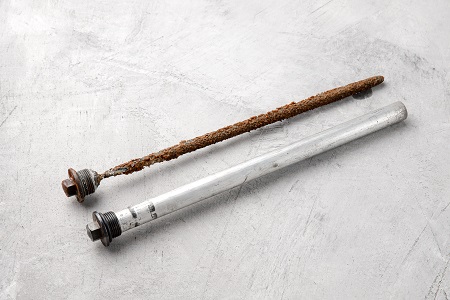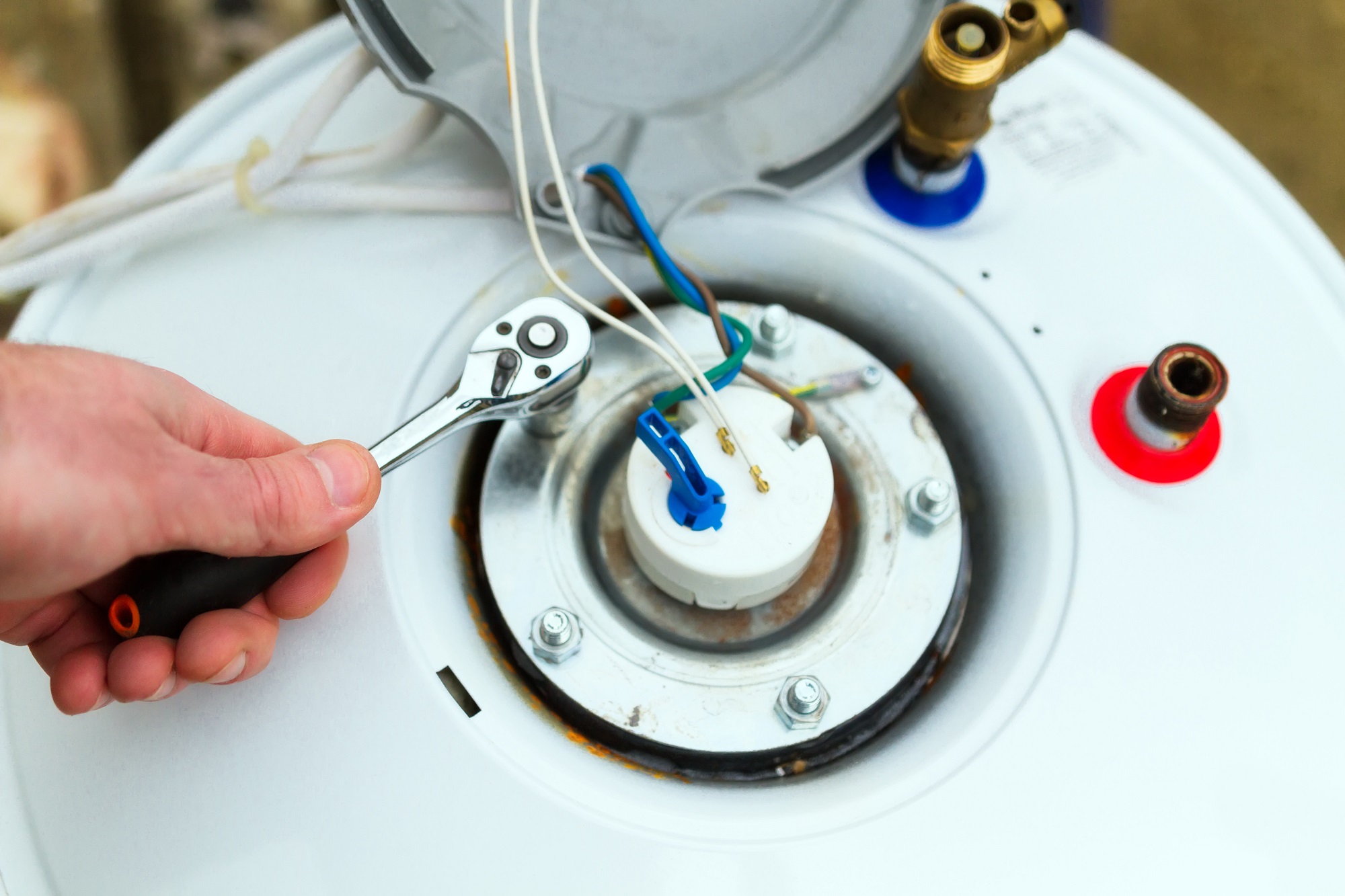Common water heater problems you might encounter include no hot water, insufficient heat, overheating, leaks, rust-colored water, or noise. Fix these by checking the circuit breaker, inspecting heating elements, adjusting the thermostat, ensuring connections, and replacing the valve or anode rod if necessary. Regular maintenance, like tank flushing, can also prevent issues. If these steps don’t solve it, you might need professional help. Want more specifics? Dive further because troubleshooting gets easier when you’re armed with the right knowledge about water heater repair from the experts at Service Plus Plumbing.
No Hot Water Problems
When you’re faced with no hot water in your home, the root cause may be a tripped circuit breaker, a faulty heating element, or a malfunctioning high-temperature limit switch. Before you panic and call a professional, there are a few things you can check yourself.
First, inspect your circuit breaker. If it’s tripped, reset it. If the hot water faucet still only spews cold water, the problem could be with the heating elements. These elements heat up the water, and if they’re faulty, they won’t be able to do their job. Testing them for continuity with a multimeter will determine if they need to be replaced.
You shouldn’t overlook the thermostat either. A faulty thermostat could be failing to properly regulate the water temperature. If it’s not working correctly, your hot water supply will be affected. You may need to adjust its settings or replace it entirely.
Lastly, check the high-temperature limit switch. This safety device prevents your water heater from overheating. If it’s malfunctioning, it could be shutting off your hot water prematurely. If, after all these checks, you’re still left with cold showers, it’s time to call a professional. They’ll be able to diagnose and repair any underlying issues.
Inadequate Hot Water Issues
If you’re experiencing an inadequate hot water supply, it’s often due to a few common issues, such as having a water heater size that’s too small for your household demand, sediment buildup in the tank, crossed hot and cold connections, or faulty heating elements.
The water heater size is crucial. If it’s too small for your household’s hot water needs, you’ll regularly run out of hot water. Upgrading to a larger unit can resolve this issue. Sediment buildup in the tank can also limit the hot water supply. Over time, minerals in the water accumulate at the bottom of the tank, reducing its capacity. Regular flushing of the tank can help prevent this buildup.
Crossed hot and cold connections can result in lukewarm or cold water. You can check for this issue by turning off the water supply to the heater and opening a hot water tap; if water continues to flow, there’s a crossed connection that needs fixing.
Faulty heating elements can also impact your hot water supply. Regular inspection and replacement of these elements can ensure consistent hot water. Lastly, don’t overlook the importance of proper thermostat adjustment. A lower setting can lead to inadequate hot water. Adjust the thermostat to a suitable range to maintain your desired hot water supply.
Overheating Water Concerns
While it’s essential for water heaters to provide hot water, overheating can lead to serious issues like scalding, potential burns, and tank damage. Overheating can cause pressure buildup within the tank, leading to potential safety hazards such as leaks or even bursts if not promptly addressed. This pressure buildup results primarily from an excessive temperature setting on your water heater’s thermostat.
So, what’s the root cause of this overheating? Often, it’s sediment buildup in your tank. This sediment insulates the water from the heater, causing it to run longer and hotter than necessary, thus increasing your energy consumption and the risk of overheating.
To prevent these issues, it’s advisable to regularly maintain your water heater. This includes flushing the tank to remove sediment buildup and checking the thermostat to ensure it’s not set too high. These simple steps can help you avoid the adverse effects of an overheating water heater. Remember, while you want your water hot, overheating is a serious concern that can lead to damage, increased costs, and even potential injury.
Troubles With Leaking Water Heater

Navigating the troubles of a leaking water heater can be a daunting task, especially when you’re confronted with issues like a faulty pressure relief valve, sediment buildup, loose drain valve, an old anode rod, or even loose connections.
Understanding the potential causes can equip you to tackle the issue better. Often, a leaking water heater might be due to:
- Faulty pressure relief valve: This safety device could be releasing water to deal with excess pressure. If it’s not functioning properly, it could be the root cause of your leak.
- Loose drain valve: If your drain valve isn’t tightened properly, it could be the source of a leak. Try tightening it, but if that doesn’t work, you might need a replacement.
- Old anode rod: The anode rod prevents your tank from rusting. If it’s old and deteriorated, it could cause your tank to leak.
In some cases, the tank itself may be damaged, necessitating the replacement of the entire water heater. If tightening the drain valve doesn’t stop the leak, it’s advisable to contact a plumber for further assessment and water heater repair.
Rust-Colored Water Dilemmas
Moving on from leaks, another common water heater issue you might encounter is rust-colored water, which typically signifies internal corrosion, often due to a failing anode rod. This discoloration is a red flag, warning you that you need water heater repair.
The anode rod, also known as the ‘sacrificial rod,’ is a crucial component in your water heater. It helps to prevent the internal corrosion that can lead to rusty water. When the anode rod fails, it can no longer perform its protective function, resulting in internal corrosion and, consequently, rusty water gushing from your taps.
To fix this, you need to engage in regular maintenance. Inspect the anode rod periodically and replace it promptly when necessary. Doing this can help prevent rust-colored water issues in your water heater and maintain the quality of your water.
However, if you’re unsure about performing these tasks, it’s best to call in a professional plumber. They can assess the situation, replace the faulty anode rod, if needed, and handle any other underlying issues efficiently. This way, you can be confident that your water heater is in good hands and that your water quality is protected.
Noise-Related Water Heater Problems
If your current water heater starts sounding like a popcorn machine, it’s likely due to sediment buildup, causing popping or rumbling noises during heating cycles. This usually happens when mineral deposits accumulate over time at the bottom of your tank.
- Sediment Buildup: The most common cause of water heater noises is sediment buildup. This is often a result of hard water, which leaves mineral deposits in your tank. These deposits can trap water underneath them, causing the water to boil and create a popping or rumbling noise. To fix this, you’ll need to flush your tank regularly to prevent sediment from accumulating.
- Mineral Deposits on Heating Elements: Sometimes, the water heating and expansion could create cracking or popping sounds due to mineral deposits on the heating elements. Regular cleaning can help prevent these noises.
- Faulty Pressure Relief Valve: A whistling or high-pitched noise may indicate excessive pressure in your tank, possibly from a faulty pressure relief valve. If you notice a leak or hear a constant hissing noise, it’s time to check and possibly replace your pressure relief valve.
Service Plus Plumbing Can Help Solve All of Your Water Heater Problems
While tackling noise-related water heater problems on your own can be a daunting task, enlisting the help of Service Plus Plumbing can make the process significantly easier and ensure all of your water heater issues are effectively addressed. As your local NE Portland plumber, Service Plus Plumbing offers top-quality water heater repair services for both homes and businesses.
Our licensed plumbers will start by providing a free estimate involving a thorough check of your water heater. We will inspect each aspect, suggest necessary repairs, and aim to extend your water heater’s lifespan. From no hot water to leaks, rusty water, or pilot light failures, our experts can fix all common water heater problems.
Regular maintenance services by Service Plus Plumbing can prevent these issues from recurring. We perform tasks such as flushing the tank, inspecting the anode rod, checking the pressure relief valve, adjusting temperature settings, and insulating hot water pipes. We can also handle more complex issues like unusual noises, smells, or persistent leaks. With our help, you can get back to enjoying hot water in no time. Trust Service Plus Plumbing to effectively repair your water heater.
Contact us today for quality plumbing professionals who care.
Plumber services we provide:
- Tankless Water Heater Services, Conventional Water Heaters, Electric Water Heaters, and Gas Water Heater Services
- Hot Water Heater Replacement Services
- Water Heater Repair
- Water Heater Installations
- Emergency Services
- And More
Visit our Testimonials page to see what our customers have to say about our plumbing company. We provide excellent customer service.

